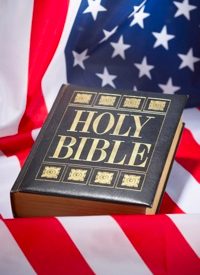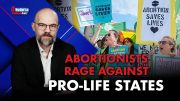
“This special period of prayer, study, catechesis, and public action would emphasize both our Christian and American heritage of liberty,” the committee said of the two-week observance. “Dioceses and parishes around the country could choose a date in that period for special events that would constitute a great national campaign of teaching and witness for religious liberty.”
Among the threats to religious liberty cited in the bishops’ statement, is the mandate announced last year by the Department of Health and Human Services requiring employers, including most religious institutions, to offer contraceptives — including abortifacient drugs — for free in their health insurance plans.
“In an unprecedented way, the federal government will both force religious institutions to facilitate and fund a product contrary to their own moral teaching and purport to define which religious institutions are ‘religious enough’ to merit protection of their religious liberty,” the statement said. “These features of the ‘preventive services’ mandate amount to an unjust law.”
While what many have referred to as the “Obama Mandate” was the “final straw” catalyst for the bishops’ call to action, it was by no means the only attacks on religious liberty they cited: As reported by the Catholic News Service, the statement also lists such examples as:
• Immigration laws in several states that “forbid what the government deems ‘harboring’ of undocumented immigrants — and what the Church deems Christian charity and pastoral care to those immigrants.”
• Discrimination against Christian students on secular college campuses.
• Actions by the city governments of Boston, San Francisco, and Washington DC, and by the Illinois state government that have “driven local Catholic Charities out of the business of providing adoption or foster care services … because those Charities refused to place children with same-sex couples or unmarried opposite-sex couples who cohabit.”
• A move by the city of New York seeking to bar some 60 churches “from renting public schools on weekends for worship services even though non-religious groups could rent the same schools for scores of other uses.”
• Changes to grants that Catholic humanitarian agencies used to help victims of human trafficking, forcing the agencies “to refer for contraceptive and abortion services in violation of Catholic teaching.”
In their statement the bishops declared that Catholics must “speak frankly with each other when our freedoms are threatened. Now is such a time. As Catholic bishops and American citizens, we address an urgent summons to our fellow Catholics and fellow Americans to be on guard, for religious liberty is under attack, both at home and abroad.”
The bishops advised “those holding public office” — a reference to, among others, President Obama and an array of liberal legislators — that it is “your noble task to govern for the common good. It does not serve the common good to treat the good works of religious believers as a threat to our common life; to the contrary, they are essential to its proper functioning. It is also your task to protect and defend those fundamental liberties guaranteed by the Bill of Rights. This ought not to be a partisan issue. The Constitution is not for Democrats or Republicans or Independents. It is for all of us, and a great nonpartisan effort should be led by our elected representatives to ensure that it remains so.”
The bishops wrote that it is a “sobering thing to contemplate our government enacting an unjust law. An unjust law cannot be obeyed. In the face of an unjust law, an accommodation is not to be sought, especially by resorting to equivocal words and deceptive practices. If we face today the prospect of unjust laws, then Catholics in America, in solidarity with our fellow citizens, must have the courage not to obey them. No American desires this. No Catholic welcomes it. But if it should fall upon us, we must discharge it as a duty of citizenship and an obligation of faith.”
Predictably, among those criticizing the bishops’ call to action for Catholic Americans was the ACLU, which charged that it is the Church that is attempting to impose its beliefs on the nation. “While the ACLU firmly supports the free practice of religion and belief — including the right of churches to minister to people regardless of their immigration status — we do not believe that any religious institution has the right to use religion as an excuse to discriminate or deny services to the public, and certainly should not expect to receive government funds to do so,” the ACLU said in a statement.
By contrast, writing on National Review Online, George Weigel of the Washington, DC-based Ethics and Public Policy Center applauded the bishops’ document as framing “with considerable precision a major issue in American public life: Will the robust networks of free and voluntary associations that Alexis de Tocqueville admired as the sinews and musculature of American democracy continue to flourish? Or will the United States increasingly resemble Western Europe, where the associational instinct (and, with it, civil society) has atrophied under the heavy weight of the European nanny state?”
Advised Andrew Knot of the Acton Institute: “This thoughtful and well-reasoned statement is a necessary read not just for Catholics, but for all concerned with religious liberty.”



